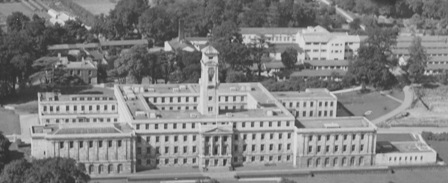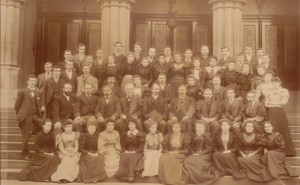
October 26, 2012, by H Cotterill
“Thousands of students yet unborn will pass along the corridors and learn in the lecture rooms…
… and wrest the secrets from nature in the laboratories. Their work will link still more closely industry with science, add to the honour of the city and help to increase the well-being of our nation.”
This was Jesse Boot, of Boots the Chemist fame, speaking in 1928 about University College, Nottingham. Some 84 years later, at the start of a new academic year, and with thousands of new students having descended on Nottingham’s campuses, we can safely state that Jesse Boot’s vision for Nottingham University has been realised. Having been working on the University College papers for the past few months, it has struck me just how much the achievements of the College’s founders and early benefactors are still of such relevance to us today.
The University College was the forerunner of the present-day University of Nottingham. Founded in 1877 and opened 4 years later in 1881, its aim was to offer education to all those in the city who wanted it, regardless of age, class or gender. Originally established in Shakespeare Street, in 1928 the College moved to the current University Park campus, then known as Highfields. It was largely thanks to Jesse Boot that the College was able to move from its cramped city accommodation. He not only provided the site of the new campus but also donated over £300, 000 for the new college buildings.
If you’re interested in family history and one of your relatives attended University College, then this collection offers you the chance to learn more about your relative’s time at the College. Covering the full period of the College’s existence, from its establishment in 1877 to its transition to the University of Nottingham in 1948, the records offer a fascinating insight into the growth of University education in the 19th and 20th centuries. Records range from the official minutes and financial records of the college’s governing body to informal photographs of staff and students. Student records include admission forms, student registers, attendance registers and testimonials. One of the most comprehensive series of student records that exists is for the College’s training department. The Day Training College was established in 1890 to train school teachers. Surviving student records for the college include registers, application forms, exam results and testimonials.
As well as collecting the official records of the University College and the University of Nottingham the Manuscripts department also collects the papers of former staff and students. These collections of personal papers help to enrich our holdings of university material and create a fuller picture of staff and student life. People with records relating to the University College or the University of Nottingham who wish to donate them to the archives should contact the department on mss-library@nottingham.ac.uk.
The records of the University College are newly available on the Manuscripts Online Catalogue.
Further information about the history of the University College and a guide to the records in the collection is available on the collections in context pages on the Manuscript’s website.
No comments yet, fill out a comment to be the first


Leave a Reply